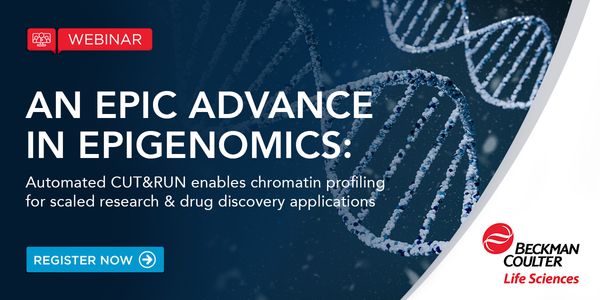Therapeutic protein characterization
Therapeutic proteins are specially designed for a particular clinical approach. Therapeutic proteins must be extensively characterized to detect molecular variants which can develop naturally or during the manufacturing or storage processes. Any modifications to the protein can impact the therapeutic efficacy and thus they must be closely monitored during development and administration.
-
DEC 12, 2023 | 10:00 AMDetermining the purity of LNPs loaded with nucleic acids can be challenging due to their size heterogeneity. Here, we present analytical ultracentrifugation (AUC) methods that use multiwavel...Most FDA-approved therapeutic drugs target transmembrane proteins, yet the development of monoclonal antibodies for multi-transmembrane protein targets has been limited. Despite the abundanc...
OCT 24, 2023 | 10:00 AM
Dynamic changes in chromatin drive gene expression programs during cellular development and contribute to pathological changes underlying disease. To date, efforts to characterize chromatin...
SEP 26, 2023 | 8:00 AM
Join us for an educational webinar that delves into the fascinating world of Extracellular Vesicles (EVs) and their impact on biomedical research and medicine. In collaboration with ExoVecto...
Speaker:
Roland Leathers, PhD
, Jeroen de Vrij, PhD
Sponsored By: Thermo Fisher Scientific/Gibco
The use of adeno-associated viruses (AAV) as gene delivery vectors has vast potential for the treatment of many severe human diseases. A small group of intensively studied AAV capsids have b...
MAY 23, 2023 | 9:00 AM
Glycosylation plays a significant role in the stability, safety and efficacy of protein therapeutics. As a result, glycan expression profiling is one of the critical quality attributes that...
APR 13, 2023 | 8:00 AM
Date: April 13, 2023 Time: 8:00am (PDT), 11:00am (EDT), 5:00pm (CEST) It is important to confirm the sequences and post-translational modifications (PTMs) of protein therapeutics to ensure d...
APR 12, 2023 | 8:00 AM
Date: April 12, 2023 Time: 8:00am (PDT), 11:00am (EDT), 5:00pm (CEST) Recombinant adeno-associated viruses (AAVs), lentiviral vectors (LVV), and adenoviru...
Alzheimer’s and Parkinson’s diseases (AD, PD) are the two most common neurodegenerative disorders. Both diseases are characterized by abnormal aggregates in the brain, which incl...
MAR 07, 2023 | 9:00 AM
Date: March 07, 2023 Time: 9:00am (PST), 12:00pm (EST), 6:00pm (CET) The ability to synthesize and sequence vast numbers of DNA constructs is a cornerstone of modern high-throughput biologic...
NOV 08, 2022 | 8:00 AM
Date: November 08, 2022 Time: 8:00am (PST), 11:00am (EST), 5:00pm (CEST) While flow cytometry shines by its flexibility, it requires a high level of expertise in antibody panel development,...
OCT 05, 2022 | 9:00 PM
Date: October 6, 2022 Time: Time: 9:30am IST, 12:00pm SGT, 1:00pm JST, KThe discovery of the CRISPR/Cas9 system has transformed research and now allows straightforward alterations in the geno...
Human respiratory syncytial virus (hRSV) is a significant cause of lower respiratory tract infections in children under the age of 5, the elderly, and immunocompromised individuals, leading...
MAY 26, 2022 | 9:00 AM
Date: May 26, 2022 Time: 9:00am (PDT), 12:00pm (EDT), 6:00pm (CEST) In early drug development, lead clone selection requires large number of clones screening in cell line development. Develo...
MAY 17, 2022 | 9:00 AM
Date: May 17, 2022 Time: 9:00am (PDT), 12:00pm (EDT), 8:00pm (CEST) Gene therapeutics have great potential to treat many severe diseases in an unprecedented, targeted manner. The biopharmace...
Learning Objectives: 1. Explain what is gene therapy is. 2. Explain what steps are involved for getting a gene therapy product to the clinic. 3. Discuss development and manufacturing process...
Speaker:
Kevin G. McGarry, Jr., PhD
, Samir Acharya, PhD
Presented at: Bioprocessing Virtual Event Series 2022
Adhesion G protein-coupled receptors (aGPCRs) are an ancient class of receptors that represent some of the largest transmembrane-integrated proteins in humans. Besides classic features of GP...
Date: November 18, 2021 Time: 9:00am (PDT), 12:00pm (EDT) Therapeutic proteins such as monoclonal antibodies (mAbs) and mAb variants have been successfully applied in the treatment of cancer...
Date: November 10, 2021 Time: 6:00am (PST), 9:00am (EST) Over the last 20 years, automated capillary electrophoresis (CE) has become an industry-preferred technique for quantitative purity a...
























